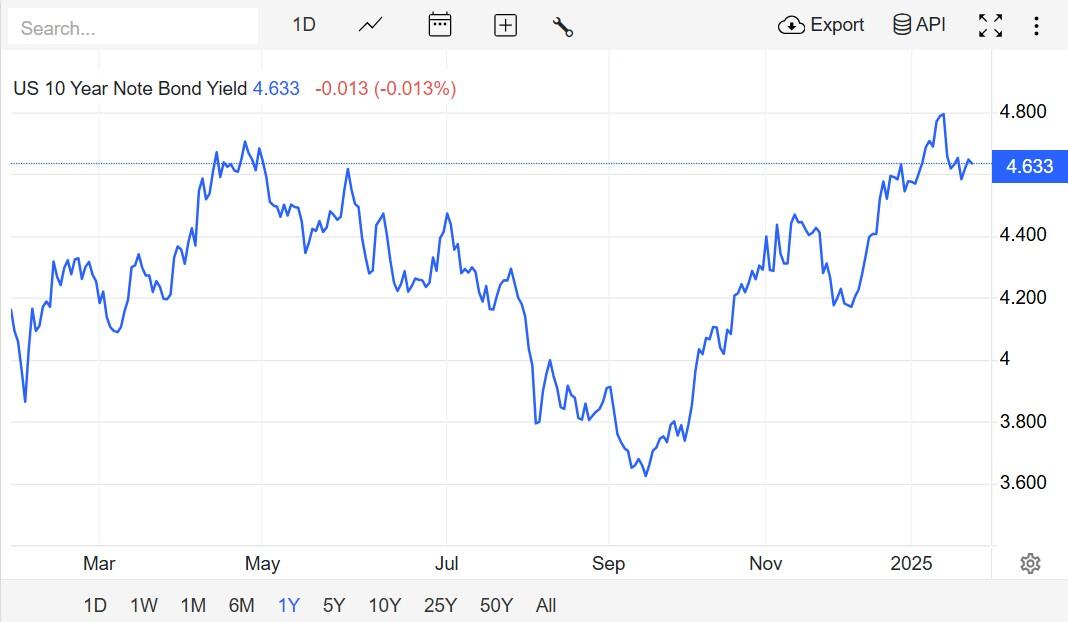While BlackRock’s CEO Larry Fink is cautiously optimistic about U.S. President Donald Trump’s plans to unleash capital in the private sector, he warns of unintended consequences that could damage share markets and see bonds yields hit two-decade highs.
Commenting from the World Economic Forum in Davos, Switzerland, Fink vocalised fears of a resurgence in inflationary pressures on the back enormous growth emanating from the unleashing of private capital.
Given that this eventuality is not factored into markets, Fink suggests keeping a watching eye on bond markets for clues.
“I think the bond market is going to tell us where we’re going. There are some very large inflationary pressures that we all have to be aware of,” Fink said.
“And that’s going to have a very negative impact on the equity market.”
US 10-year Treasury yield could hit 25-year high
Given that bond and equities are non-correlating assets – meaning they move in opposite directions to each other – Fink believes the likelihood of 10-year Treasury yield hitting 5.5% could ignite a sharp share market sell-off.
The benchmark 10-year note yield last traded at 4.62% and the last time they reached 5.5% was in 2000.
Admittedly, this worst case scenario may hinge on how quickly the private sector can put capital to work. However, Fink cites Trump’s massive private sector promises to spend in the U.S.
For example, Trump’s plans to create a $500 billion artificial intelligence infrastructure and a recently announced Stargate joint venture is expected to see SoftBank, OpenAI and Oracle invest an initial $100 billion immediately.

A revaluation of equities
While the prospect of the 10-year yield eclipsing 5% isn't Fink's base case scenario, he reminded markets that this outcome could force a revaluation of equities.
Growing fear of a resurgence in inflation, which could cause interest rates to stay higher for longer, has already seen Bond yields rollercoaster over the past year.
Unsurprisingly, bond investors remain glued to the latest nuance in Trump's trade policies with the 10-year yield nudging 5% this month before retreating on the back of softer inflation data and less onerous than expected tariff orders.
Meanwhile, Fink also fears that if yields end up exceeding 5%, it could reignite the conversation around U.S. debt management.
Australian fallout
AMP chief economist Shane Oliver believes a trade war could reduce demand for Australian export, but he suspects this will lead to lower inflation locally.
While tensions over tariffs could disrupt global trade – including Australia’s export of iron ore and coal - Stella Huangfu from the University of Sydney believes rising US-China tensions might prompt China to find alternative suppliers and potentially boosts Australia’s commodity exports.
Kyle Rodda of Capital.com echoed similar sentiment, noting that while Trump’s tariffs were likely to be deflationary, the greater risk is weaker growth, due to the impact of tariffs on China’s ailing economy.
While economists have no clear fix on whether a second Trump term would benefit or harm Australia, Tim Reardon of the Housing Industry Association believes U.S-China trade tensions could boost Australia’s export opportunities, especially in agriculture.
However China is impacted, be it via extreme tariffs directly or whether it be via a reduction in global trade, Katrina Ells head of Asia-Pacific economics at Moody’s Analytics believes it translates to a weaker Australia.
“If China isn’t able to turn around that domestic weakness and then it’s hit on the export side via these tariffs, and then weaker consumption as well, then Australia will experience a weaker trajectory that way.”



